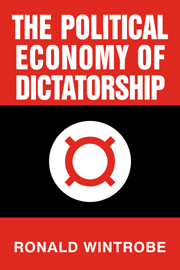Book contents
- Frontmatter
- Contents
- Dedication
- Acknowledgments
- Part I Introduction
- Part II Equilibrium political repression
- Part III Economics of autocracy
- Part IV The dynamics of dictatorship
- 11 Democracy in the inaction zone
- 12 Ethnic conflict and nationalism: from expressionism and futurism to kitsch
- 13 The simple economics of criminal bureaucratic
- Part V Conclusion
- References
- Name index
- Subject index
11 - Democracy in the inaction zone
Published online by Cambridge University Press: 05 June 2012
- Frontmatter
- Contents
- Dedication
- Acknowledgments
- Part I Introduction
- Part II Equilibrium political repression
- Part III Economics of autocracy
- Part IV The dynamics of dictatorship
- 11 Democracy in the inaction zone
- 12 Ethnic conflict and nationalism: from expressionism and futurism to kitsch
- 13 The simple economics of criminal bureaucratic
- Part V Conclusion
- References
- Name index
- Subject index
Summary
Introduction
This part of the book looks at some aspects of the dynamics of dictatorship – that is, its origins and some of its consequences. This chapter is concerned with political inaction – the conditions under which democratic politicians may fail to respond to or provide leadership on important political issues, thus effectively suppressing the demands of their constituents to “do something” about them. The inertia or powerlessness of democracy under certain conditions is one of the seeds of dictatorship, since dictators can act under many circumstances in which democratic politicians cannot. I show the forms of social structure which are particularly likely to result in this pathology – for example, polarized political parties, rigid political preferences, and lack of trust in politicians and in the political system.
Another germ of dictatorship is ethnic conflict and nationalism. These phenomena are modeled in Chapter 12. Ethnicity is modeled as a capital good which reduces the transaction costs of market and political exchange within the group. Investments in ethnicity have two peculiar features:
Much of the investment is done by parents for the benefit of their children
The payoff to an individual depends on investments made by others in the group and on the group's collective (political) choices.
Hence the potential for conflicts of various sorts, both between groups and between generations. I show that neither market nor democratic political mechanisms can easily resolve these conflicts.
- Type
- Chapter
- Information
- The Political Economy of Dictatorship , pp. 247 - 279Publisher: Cambridge University PressPrint publication year: 1998



